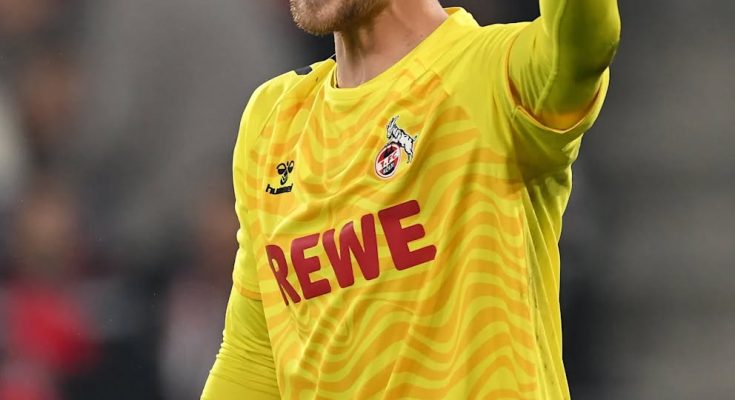FEDERAL LEAGUE SENSATION! A real bang shakes German football, and it comes right out of Cologne: Marvin Schwäbe, the reliable and highly respected regular goalkeeper of 1. FC Köln, has made a decision that has stunned fans, experts, and rivals alike. Despite a gigantic and tempting offer from Bayer Leverkusen, one of the Bundesliga’s current powerhouses and Cologne’s fiercest rivals, Schwäbe has chosen to remain loyal to the Billy Goats. In an era where money and prestige so often dictate football careers, this move feels like a reminder of older football values – loyalty, identity, and an emotional bond with the supporters. The news has spread like wildfire, sparking heated debates across Germany about what it means for Cologne, for Leverkusen, and for the Bundesliga as a whole.
For Cologne, the announcement comes as a huge sigh of relief. The club, which has been battling to establish itself in the league against better-financed competitors, has relied heavily on Schwäbe’s performances over the last few seasons. Time and again, the goalkeeper has been their lifesaver, pulling off world-class saves and ensuring points in matches that otherwise looked lost. Losing him would not only have been a sporting disaster but also a symbolic blow. After all, how often does a player cross the Rhine and switch from the Effzeh to Bayer? For fans, that would have been nothing short of betrayal. Now, instead of lamenting an outgoing transfer, they celebrate Schwäbe as a hero who resisted the lure of money and chose heart over wallet.
For Leverkusen, however, the situation is different. Fresh off recent successes and having transformed into one of Europe’s most admired attacking machines, Bayer wanted to secure the services of a top-level goalkeeper to stabilize their backline for the coming seasons. The offer reportedly included a massive salary hike, a long-term contract, and the chance to compete in the Champions League regularly. For many players, this would have been an irresistible opportunity. But Schwäbe, in a move that underlines his personality and character, said no. To reject not just any club, but Bayer Leverkusen of all teams – Cologne’s hated neighbor – adds a whole new layer of intensity to the rivalry. The derby has always been charged with passion, but Schwäbe’s decision has made him a cult figure overnight among Effzeh supporters.
Experts across German football are still trying to digest the meaning of this decision. On the one hand, it shows that even in modern football, not every player is swayed by money. On the other, it raises the question of what Cologne promised Schwäbe in return. Was it simply loyalty? Was it a promise of an extended leadership role, perhaps even the captain’s armband in the near future? Or does he genuinely believe in Cologne’s sporting project, seeing potential for growth and success in a team often viewed as underdogs? The truth probably lies in a mix of all these factors. Schwäbe, who has fought hard in his career to reach the top, knows what he has in Cologne: a guaranteed starting spot, a fan base that adores him, and a team environment where he is trusted. Sometimes, the intangible values outweigh the concrete numbers on a paycheck.
For Cologne fans, the emotional resonance of this decision cannot be overstated. In recent years, they have seen many of their best talents leave the club in search of bigger opportunities, often leaving supporters disillusioned. Players like Anthony Modeste, Jonas Hector’s eventual retirement, and countless others showed how fleeting loyalty can be in modern football. Schwäbe’s refusal to jump ship is therefore not just a personal victory but a collective one for the city and its supporters. The Südkurve at the RheinEnergieStadion is already preparing chants and banners to honor their goalkeeper, who has now become the symbol of resistance against the financial muscle of richer clubs. This is the kind of moment that strengthens the bond between a player and the fans for life.
The rivalry between Cologne and Leverkusen is not only geographic but also deeply emotional. The Rhine derby carries a special intensity, with both sets of fans despising the idea of losing a player to the other. For Schwäbe to turn down Leverkusen’s millions is seen as a double victory by Effzeh fans. Not only do they keep their keeper, but they also deny their rivals the chance to weaken them and strengthen themselves simultaneously. The psychological edge in future derbies could be significant. Leverkusen’s failed coup might even fuel Cologne’s motivation to punch above their weight when the two clubs next clash.
Financially, the story is just as fascinating. Cologne could never match Leverkusen’s offer in pure numbers. The Werkself are backed by Bayer’s corporate power, while Cologne operates on a more modest budget, often selling before they can buy. That Schwäbe still decided to stay highlights an important truth: money alone does not guarantee success in attracting players. Identity, belonging, and respect matter just as much. Schwäbe knows that at Leverkusen he would be part of a star ensemble, perhaps less celebrated individually, while at Cologne he is the cornerstone. It is the difference between being a name on a team sheet and being the beating heart of a club.
This saga also raises questions about the future of both clubs. For Cologne, Schwäbe’s loyalty can be the foundation for building something stable in turbulent times. Goalkeepers often bring continuity and leadership, and with him between the posts, the team has one less area of concern. For Leverkusen, the failed transfer will sting, but it also underlines that their ambitious project is not without limits. They may dominate the transfer market in many ways, but they cannot buy history, emotion, or loyalty. That realization may force them to reconsider how they approach future targets, particularly when it comes to prying players away from rivals.
The press across Germany has been quick to label this as one of the biggest transfer shocks of the season. Headlines speak of “unbelievable loyalty,” “a hammer decision,” and “the derby of values.” Some commentators even suggest that Schwäbe’s move could inspire a new wave of loyalty among players who are tired of chasing money and instead prefer stability and appreciation. While it may be too early to call this a trend, Schwäbe’s decision will certainly be used as an example in future debates about football’s soul.
In Cologne, the mood is euphoric. Social media exploded with memes, tributes, and emotional posts from fans thanking Schwäbe for his loyalty. Some even called for a mural to be painted in his honor, while others suggested he should be given the freedom of the city. In football, where results often dictate how players are remembered, moments like these cement a player’s place in club history. Whatever happens on the pitch, Schwäbe’s decision has already guaranteed him legend status among the Effzeh faithful.
Looking ahead, one thing is certain: the next Rhine derby will carry even more drama than usual. Schwäbe will walk onto the pitch not just as Cologne’s goalkeeper but as the man who rejected Bayer’s millions. Every save he makes will feel like a dagger in Leverkusen hearts, every cheer from the Cologne fans a reminder that loyalty still matters. For the Bundesliga, this storyline adds spice to a season already filled with intrigue. Beyond titles and relegation battles, it is these human stories – of choices, loyalty, and identity – that make football the emotional spectacle it is.
Marvin Schwäbe’s decision to reject Bayer Leverkusen is more than just a transfer story. It is a statement. A statement that in modern football, where agents, numbers, and market values dominate the conversation, the human side still exists. A statement that a player can still prioritize belonging over bank accounts. And a statement that the rivalry between Cologne and Leverkusen remains one of the most intense and fascinating battles in German football. In years to come, fans will look back on this moment as one of those rare instances when the game reminded everyone why they fell in love with it in the first place.
In the end, Schwäbe’s choice will be judged not just by its symbolism but by what happens next. If Cologne can use this loyalty as a springboard to greater stability and success, then this could be remembered as a turning point in their history. If, however, the team continues to struggle, critics might argue that Schwäbe missed his chance to play at the very top. But for now, those voices are silent, drowned out by the roar of the Südkurve. For Cologne supporters, one thing is crystal clear: they have their hero, their guardian between the posts, and he is one of them – not one of Leverkusen. And that alone is worth more than any transfer fee or paycheck.


